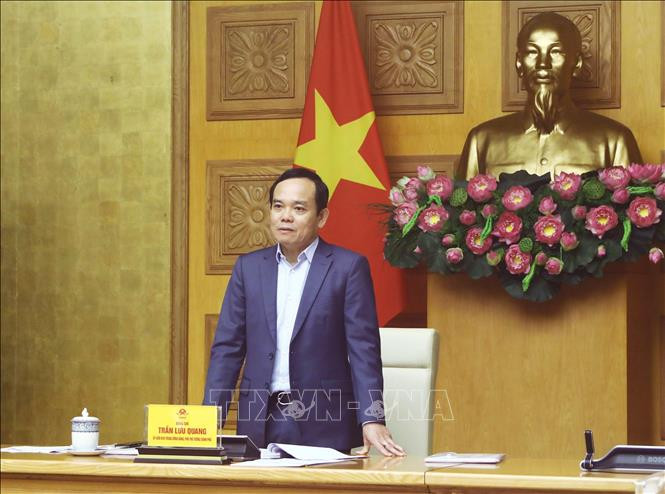On December 11, Deputy Prime Minister Tran Luu Quang chaired an online meeting with 10 localities whose disbursement rate for implementing national target programs reached less than 50% of the 2023 plan.

Meeting with leaders of the provinces: Dien Bien, Hoa Binh, Ha Tinh, Quang Binh, Quang Nam, Binh Dinh, Phu Yen, Dak Nong, Binh Thuan, Kien Giang to remove difficulties and obstacles, speed up the implementation of national target programs.
According to the report of the Ministry of Finance, by November 30, 2023, the disbursement progress of the 2023 capital plan of Dien Bien was about VND 583,187 billion, reaching 46% of the plan; Hoa Binh about VND 300 billion, reaching 48% of the plan; Ha Tinh about VND 105,708 billion, reaching 38% of the plan; Quang Binh about VND 175,742 billion, reaching 48% of the plan; Quang Nam about VND 422,959 billion, reaching 44% of the plan; Binh Dinh about VND 148,330 billion, reaching 44% of the plan; Phu Yen about VND 93 billion, reaching 43% of the plan; Dak Nong about VND 240 billion, reaching 39% of the plan; Binh Thuan about VND 128,120 billion, reaching 49% of the plan; Kien Giang about VND 80 billion, reaching 40% of the plan.
For public investment capital in 2022 extending to 2023, the disbursement rate of localities reached from 58 - 100%, of which, Binh Thuan completed disbursement of capital in 2022, Phu Yen reached 96% and Dak Nong reached 84%.
Explaining the reason for the slow disbursement, the Ministry of Planning and Investment said that a number of regulations on management and implementation of national target programs need to be revised, supplemented and updated because many problems and shortcomings still arise in practice. Some documents responding to recommendations on the implementation of national target programs are not really clear, leading to difficulties in directing implementation.
In addition, poor households, multidimensional near-poor households, households escaping poverty, and households escaping near-poverty in some localities mostly have members who are sick, disabled, lack land to build barns, lack labor to participate in projects, etc., so they do not meet the conditions to participate in projects, production plans, and services according to regulations such as ensuring facilities, labor, means of production, and commitment to ensure counterpart funds to implement projects and plans. A part of the people still have a mentality of dependence, waiting for support from the State, not being aware of and supporting others to rise out of poverty sustainably.
The Ministry of Planning and Investment said that the national target program for socio-economic development in ethnic minority and mountainous areas was implemented for the first time, so there were still some confusions in some places. Staff at units and localities often worked part-time, so they did not really grasp the contents of the guidance documents, which affected the progress of the program. Some goals and tasks of the program have not been implemented and need to be reviewed and adjusted to suit practical conditions and legal grounds.
Indicators such as: Indicators on the proportion of population with electronic medical records, population with health management, people participating in and using remote medical examination and treatment applications; indicators on clean water in rural areas... are difficult to achieve.
The mobilization of resources to implement the national target program has achieved certain results, however, many localities still face difficulties in balancing counterpart resources from local budgets to implement the programs. The regular allocation of detailed central budget estimates according to component projects and expenditure areas has limited the initiative of localities in allocating and using resources in accordance with the needs and practical conditions of the locality at each time.
In addition, the capacity to manage and organize the implementation of national target programs in localities is not uniform. In addition, the situation of natural disasters and floods in some areas in the last 6 months of 2023 is complicated and difficult to predict; localities need a certain amount of time to implement and disburse capital immediately after policies are amended and supplemented.
Concluding the meeting, Deputy Prime Minister Tran Luu Quang requested the 10 localities to make greater efforts, strive, and be more determined because in reality, with similar conditions, some localities still achieve higher disbursement rates. The Deputy Prime Minister noted that in addition to progress, localities need to focus on project quality and the effectiveness of program implementation.
The Deputy Prime Minister pointed out the current situation in some localities where the capital ratio of the three national target programs is insignificant compared to the total capital for basic construction investment, but the disbursement rate is still low due to lack of proper attention. The Deputy Prime Minister suggested that when localities have problems, they should proactively learn from the experiences of other localities, exchange directly with ministries and branches through established hotlines; focus on investing with focus and key points to both shorten the time to prepare project documents, ensure the quality and efficiency of project investment, and protect cadres.
Localities must pay special attention to improving the capacity of implementing and preparing project documents for grassroots officials so that they can undertake the work after being decentralized. If necessary, they can set up working groups to go down to the grassroots to provide guidance, as many localities have effectively implemented.
The Deputy Prime Minister requested that central ministries and branches continue to review and discuss outstanding issues and promptly support localities in speeding up capital disbursement for national target programs.
The Deputy Prime Minister said that in January 2024, the National Assembly is expected to meet to resolve 8 groups of problems related to the implementation of national target programs, including the following contents: career capital; decentralization to localities to decide on the list of investment projects; authority to decide on the policy of changing the purpose of forest use; policy to adjust the National Target Program on socio-economic development of ethnic minority and mountainous areas...
According to Tin Tuc newspaper